Russia and England: moving east
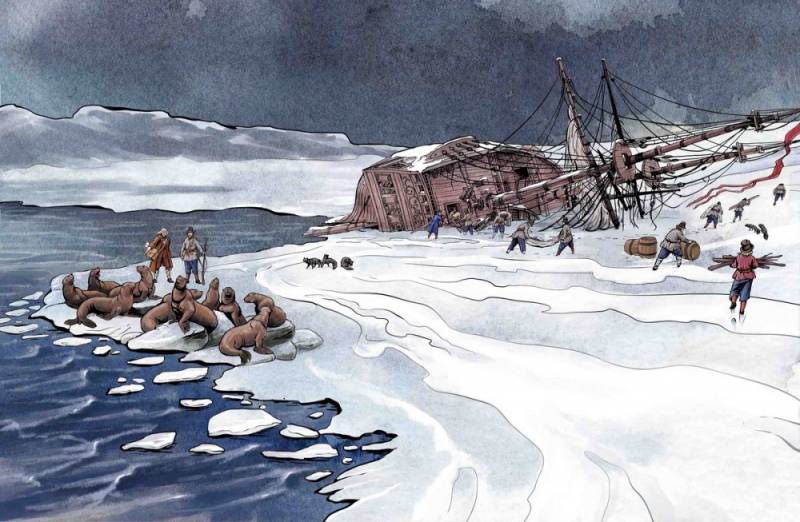
Wintering expedition of Bering
Oddly enough, the cold northeast coast of Asia has always been of great interest to the gentlemen of the distant British Isles. The movement of Russian pioneers to the east and to the Pacific Ocean was a natural and inevitable process - like the movement of American colonists to the west. It was both organized and spontaneous in nature, and at the peak of the development of new lands, Russian settlers "jumped" across the ocean, ending up on the American continent. However, for a variety of reasons, they could not gain a foothold on it.
The interest of the British was quite different. The British in this case did not seek to populate the wild expanses of Chukotka or Kamchatka. They were looking for new territories for organizing unequal trade, markets for their goods, and new trade routes that they wanted to "saddle" and control, preventing competitors from entering them.
The first "studies" of the British
The northern and eastern territories of the Moscow kingdom attracted the attention of the British as early as the middle of the XNUMXth century.
It all started in August 1553, when the English ship Edward Bonaventure, captained by Richard Chancellor, anchored in the Dvina Bay of the White Sea near the so-called Summer Coast (where Severodvinsk was later founded). It was one of three English ships sent east by the British, two more were lost on the way.
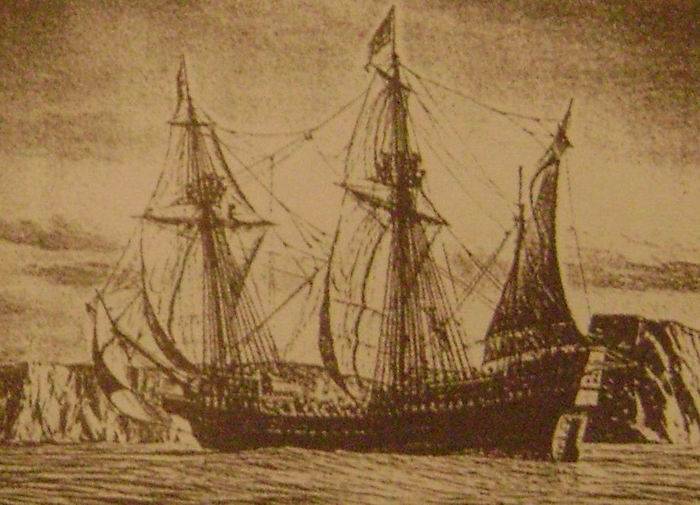
The ship "Edward Bonaventure" at the North Cape, painting by an unknown artist
The British were looking for a new route to China, which, as they believed, could be reached by sailing up the Ob River. And they found the gate to the Moscow kingdom, which surprised Chancellor with its size and potential. Chancellor reported to London:
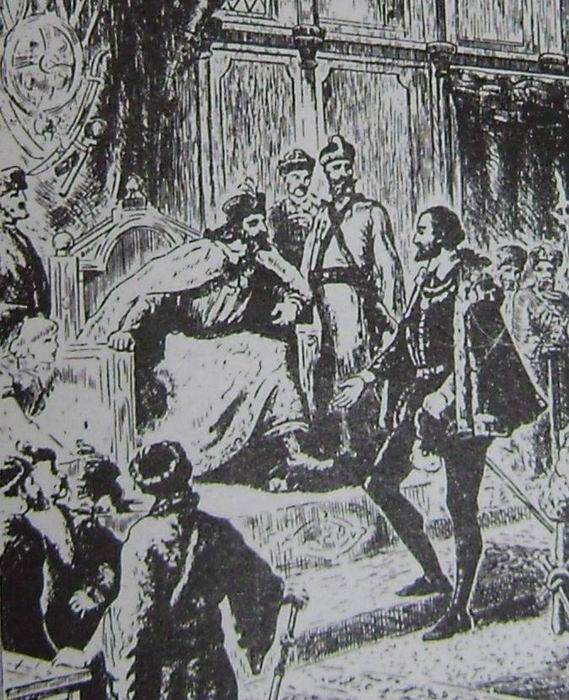
Richard Chancellor at a reception at Ivan the Terrible, fragment of an XNUMXth-century French engraving
In 1555, the British company "Society of Merchants-Prospectors for the Discovery of Countries, Lands, Islands, States and Possessions unknown and hitherto unvisited", which equipped Chancellor's expedition, was renamed Moscow.
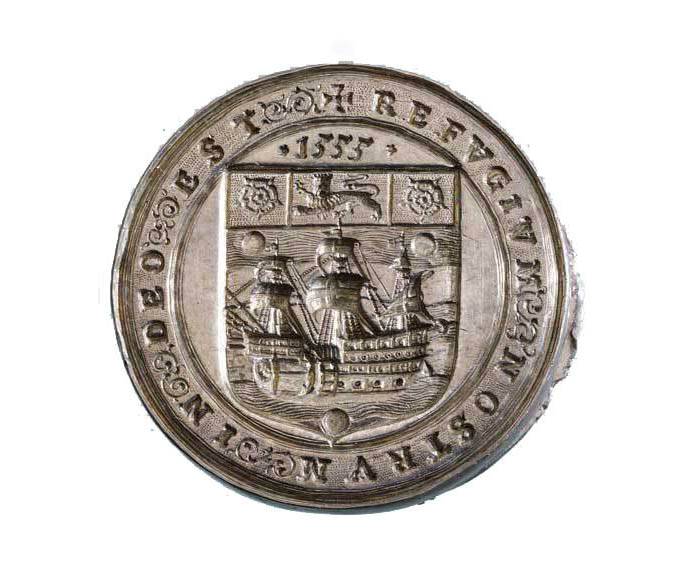
Coat of arms of the English Moscow Company
Its activities were briefly interrupted in 1649 - after the execution of Charles I Stuart, but was resumed in 1660 with the accession of Charles II Stuart. In 1698, Peter I issued a decree depriving the English Moscow Company of monopoly privileges, but officially it existed until 1917. In London, there are still toponyms associated with the activities of this company: Russia Row Street (the headquarters of the Moscow Company was located here), Russia Dock Woodland Park (at the site of the dock where the wood was unloaded), Russia Dock Street, Muscovy Street and Onega Gate.
Let's go back to the middle of the 1556th century and see that already in XNUMX, Captain Stephen Barrow reached the mouth of the Ob on the Sercheroft pinnace. Moreover, he not only did not receive consent from the Russian authorities for this, but did not even notify them of his voyage.
In 1558-1560. Anthony Jenkinson, sent by Mary Tudor to Moscow instead of Chancellor, who died at sea, already with the permission of Ivan the Terrible, who at that time favored the British, sailed along the Volga to the Caspian Sea. From Moscow he got to Astrakhan, and from it to Bukhara.
In 1562 he repeated his journey down the Volga to the Caspian Sea, this time visiting the Persian cities of Qazvin and Shemakha. Returning to London, he published a "Map of Russia, Muscovy and Tartaria", which correctly displayed the Ural Mountains, and even indicated "Molgomzeya" - an area in the north of Western Siberia on the territory of the modern Khanty-Mansiysk Okrug. The first Russian city (Mangazeya) will be founded here only in 1601.
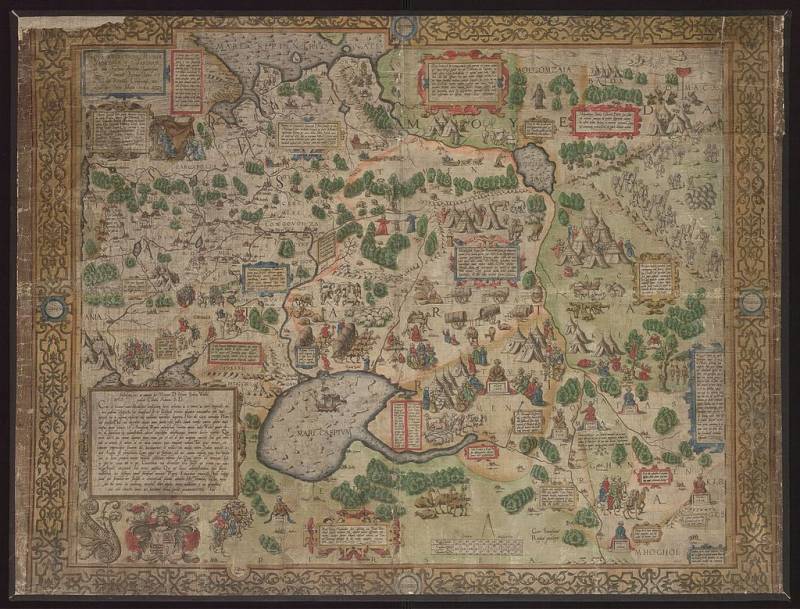
Map of Jenkinson, 1562
Thus, in the 9 years that have passed since the arrival of Richard Chancellor, the British managed to conduct a thorough reconnaissance of waterways not only in the European, but also in the Asian part of Russia.
In 1580, Arthur Pat and Charles Jackman on the ships George and William sailed along the northern coast of Russia to the entrance to the Kara Sea. On the way back, the British lost one ship.
In 1620, the government of Mikhail Fedorovich Romanov finally took notice of these extremely suspicious "explorations of the Arctic" and banned the navigation of foreign subjects in the internal sea waters of Russia. However, all other privileges of this company have been confirmed.
English agents and Russian "well-wishers" of London
Under Peter I, a huge number of foreign specialists, including sailors, were attracted to the Russian service. This influx of foreigners had a side effect, because along with really valuable specialists (like Cornelius Cruys and Vitus Bering hired by him), adventurers and, possibly, professional intelligence officers came to Russia. It is known that some documents and materials related to Russian exploration of the eastern coast of Eurasia have disappeared from the archives. But the logbooks of expeditionary ships until the beginning of the XNUMXth century. were considered secret documents, they were not issued even to employees of the Academy of Sciences. It is possible that the cause of these losses was elementary irresponsibility and carelessness. But one cannot rule out the bribery of archival officials by agents of foreign states or the activities of “well-wishers” who did not miss the opportunity to disinterestedly render a service to their homeland. If the second assumption is correct, then one can only guess how many copies were made from the documents remaining in the archives.
The names of some high-ranking foreign intelligence officers are well known. One of them was the English envoy at the court of Peter I, Baron Charles Whitworth, a full namesake and relative of another envoy who was in St. Petersburg in 1788-1800.
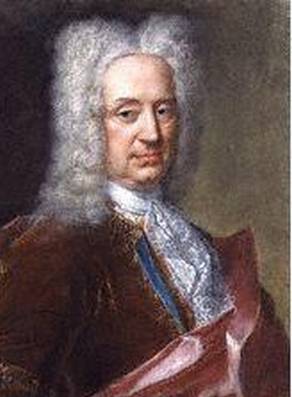
Baron Charles Whitworth
And in this portrait by Giovanni Battista, his nephew is Count Charles Whitworth, who is suspected, if not of organizing, then at least of financing a conspiracy against Paul I:
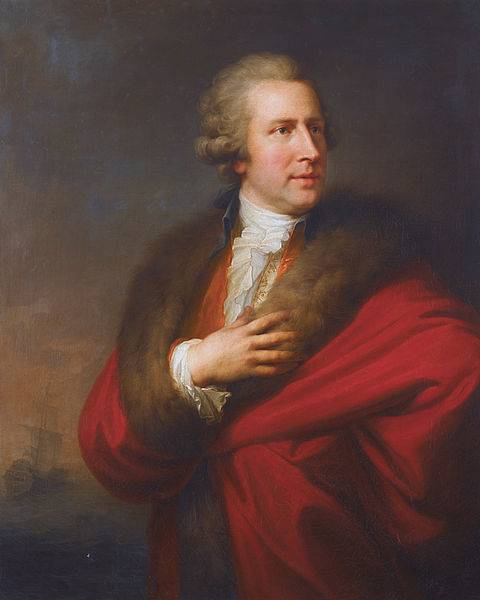
It can be fairly confidently asserted that Baron Whitworth's informant was the Vice-Chancellor, and then the head of the Ambassadorial Department Pyotr Shafirov. In 1708, in a letter to London, Whitworth reports that Shafirov accepted 400 pounds from him, expressing "deep gratitude" and "readiness to continue to serve Her Majesty(To Queen Anne Stewart of England).
And in April 1709, Whitworth reported to London about A. Menshikov’s request to apply for a passport for his relative, Vasily Aksenov, and about his intention to first make sure how the prince “willing to use his influence» in lobbying for British interests. For a rich, like Croesus, thieving favorite of Peter I, sums of 400 pounds or so were, of course, simply ridiculous (although he never disdained such things). Of much greater interest to him, probably, was assistance in transferring accumulated funds abroad (in the end, he withdrew his capital to the banks of Venice and Amsterdam, from where they managed to return them with great difficulty during the reign of Anna Ioannovna).
The “Merry Queen” Elizaveta Petrovna was mainly interested in balls and masquerades. Not surprisingly, its ministers interacted more than informally with foreign ambassadors and commercial agents. The example was set by the chancellor of the Russian Empire A.P. Bestuzhev-Ryumin, who unexpectedly became the positive hero of the TV movie “Midshipmen forward”. The review that the Prussian king Frederick II left about him has been preserved:
From his government, the chancellor received a salary of seven thousand rubles, and from the British - twelve thousand. He also took money from the Austrians.
About another chancellor of Elizabeth - M. I. Vorontsov, Catherine II already said that he "sold to every buyer; there was no court that did not support him on a salary».
His nephew was the Russian ambassador in London and a desperate Angloman Semyon Vorontsov, his nieces were the favorite of Peter III, Elizaveta Vorontsova, and an active participant in the conspiracy against this emperor, Ekaterina Dashkova. It is curious that if the participants in the conspiracy against Peter III were good friends of Ekaterina Dashkova, then the conspirators who killed the son of this emperor, Paul I, as well as some close employees of Alexander I, were well acquainted with her brother, Semyon Vorontsov. This is his son - Mikhail, Pushkin called in his epigram "semi-lord". M. Vorontsov was brought to England as a child of three years old, at the age of 4, without leaving London, he became an ensign of the Preobrazhensky Regiment, returned to Russia when he was 19 years old. Mikhail Vorontsov knew English better than Russian, and his palace in the Crimea looks like a real English castle. He was his own man in the high society of London, a friend of many offspring of British lords, the planted father of his bride, the Pole Elizabeth Ksaveryevna Branitskaya, became the famous commander Arthur Wellesley, the first Duke of Wellington (the wedding took place in Paris in 1819).
Semyon Vorontsov's daughter and Mikhail's sister, Ekaterina, did not return to Russia. She married Lord George Herbert, 11th Earl of Pembroke, 8th Earl of Montgomery. Catherine's son was Secretary of the British Council of Control, Deputy Secretary of the Navy, Minister of the Colonies. During the Crimean War, he served as Secretary of State for War.
Of course, by no means can one call Semyon Vorontsov and his son Mikhail agents of British intelligence, but they certainly were high-ranking and completely voluntary “agents of English influence”.
Imperial period of exploration of the east coast of Asia
But back to the cold waters of the North Pacific.
In 1778 the ships of James Cook came to the Chukchi Sea (his third voyage).
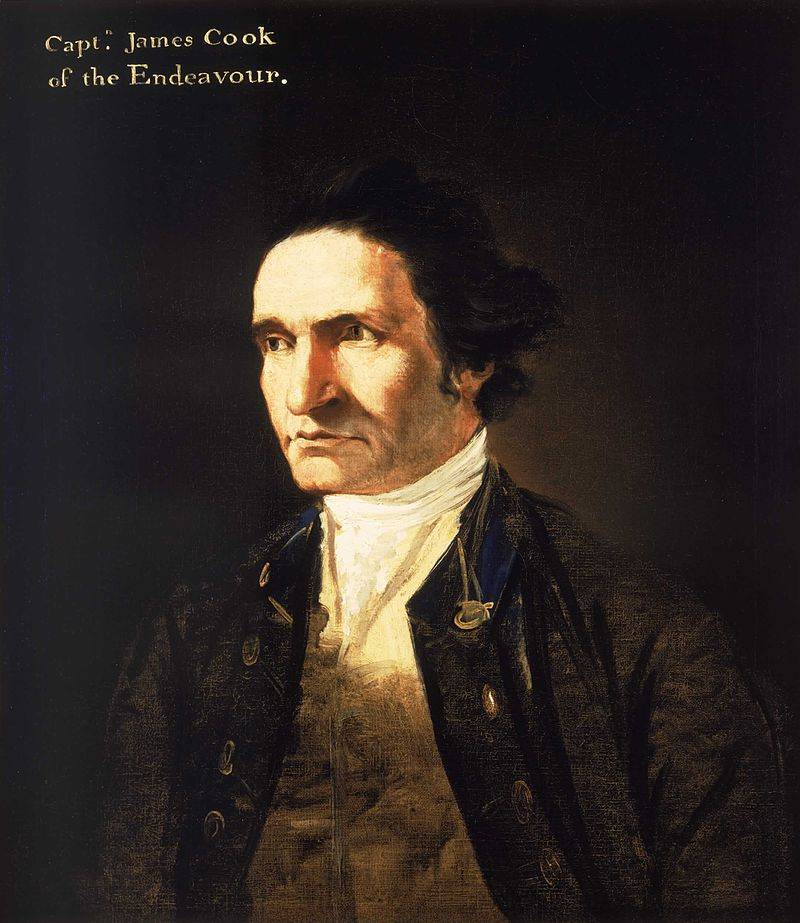
James Cook in a portrait by William Hodges
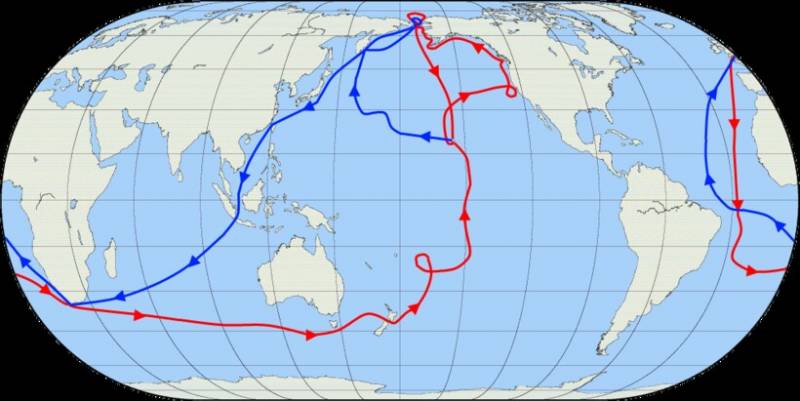
Itinerary of James Cook's third voyage
It was Cook, who met with Russian merchants-industrialists who showed him maps drawn up during the Second Kamchatka Expedition, who proposed calling the strait separating Asia from America Bering (although Semyon Dezhnev was the first to pass through it).
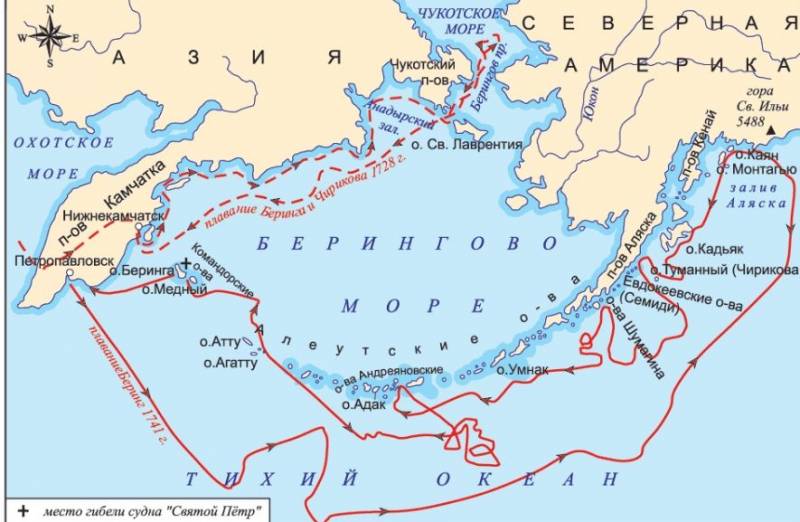
Bering's second Kamchatka expedition, map
James Cook was killed on the way back on one of the Hawaiian Islands (which, by the way, he discovered and named the Sandwich Islands). He was replaced as leader of the expedition by Captain Charles Clerk. In 1779, he again took his ships north and died off the coast of Kamchatka.
Oddly enough, the question of the presence of a strait between the northern coasts of Asia and America at the end of the 1785th century was still open. Even after the second expedition of Bering, the Russian authorities continued to doubt the existence of this strait. And Cook's third voyage convinced no one in London. To finally resolve the issue of the strait between Asia and North America in 1728, a new expedition was organized in Russia. It was led by a participant in the third voyage of James Cook - the Englishman Joseph Billings. He was warmly recommended for this position by the well-known Anglophile Semyon Vorontsov, the Russian ambassador in London. Gavriil Andreevich Sarychev became Billings' deputy. It is curious that Billings' report was immediately printed abroad in English, German, French and Italian, and the Russian translation of this work was never bothered to be published. Even more “interesting”, by the way, happened with Vitus Bering’s watch log “Saint Gabriel” for 1279-1973, which was completely considered lost until in XNUMX it was discovered in the Central State Archive of the Naval Fleet THE USSR.
It is also interesting that upon returning to St. Petersburg, Billings asked to be transferred to Sevastopol, since he really wanted to conduct a hydrographic survey of the Black Sea. He compiled an inventory of the coast from the Kerch Strait to the mouth, as well as near Odessa and its environs, in 1799 he published an atlas of the Black Sea, after which he asked to resign.
Did he share any confidential information with the British? It is difficult to say, there is no evidence of such cooperation, but there is nothing impossible in such an assumption: he could cooperate - in order to earn some money, or disinterestedly, out of love for the abandoned homeland.
Under Catherine II, another expedition was planned to the eastern shores of the Russian Empire, and Russian sailors were supposed to travel around the world. Grigory Ivanovich Mulovsky was appointed head of the expedition, one of his captains was another member of Cook's third voyage - James Trevenen, a former midshipman of the ship "Resolution".
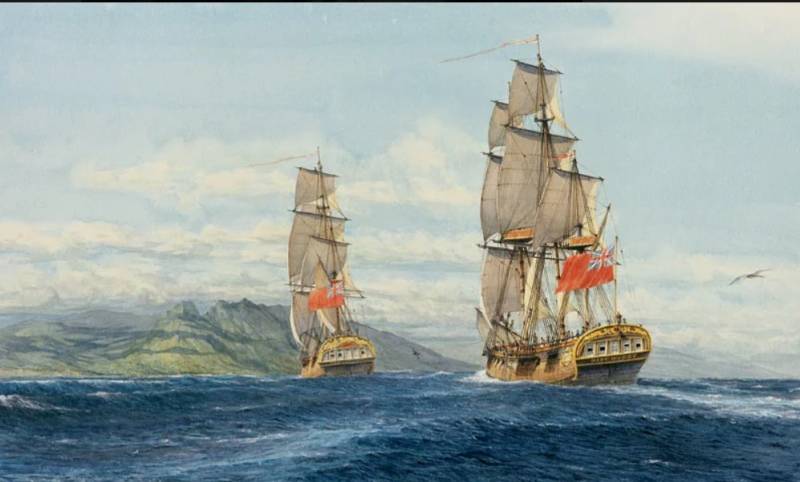
Resolution and Discovery - ships of Cook's 3rd expedition in the picture of G. Miller
Mulovsky's expedition failed due to the outbreak of war with Turkey, and then with Sweden. G. Mulovsky, the head of this failed expedition, died in 1789 during the Battle of Eland on the ship Mstislav. And in July 1790, during a naval battle in the Vyborg Bay, Trevenen, who was then the captain of the 66-gun ship Don't Touch Me, also died. Therefore, we bow our heads to honor the memory of the hero who was buried with military honors in Kronstadt. But still, we note the very great interest shown by the members of the crews of the Cook ships to Russian exploration of the eastern coast of Asia.
Looking ahead, let's say that Russian sailors nevertheless made a round-the-world trip - already during the reign of Alexander I: in July 1803, the sloops Nadezhda (commanded by I. Kruzenshtern) and Neva (captain - Y. Lisyansky) set off on a campaign . On the sloop "Nadezhda" there were very interesting people. For example, Thaddeus Bellingshausen is a future Antarctic explorer. Nikolai Rezanov, who will soon meet in California with the young Spaniard Maria de la Concepción Marcella Arguello, better known as Conchita. Returning to St. Petersburg, Rezanov will die in Krasnoyarsk - in February 1807 at the age of only 42 years. This story is known to everyone thanks to the famous opera by Alexei Rybnikov.
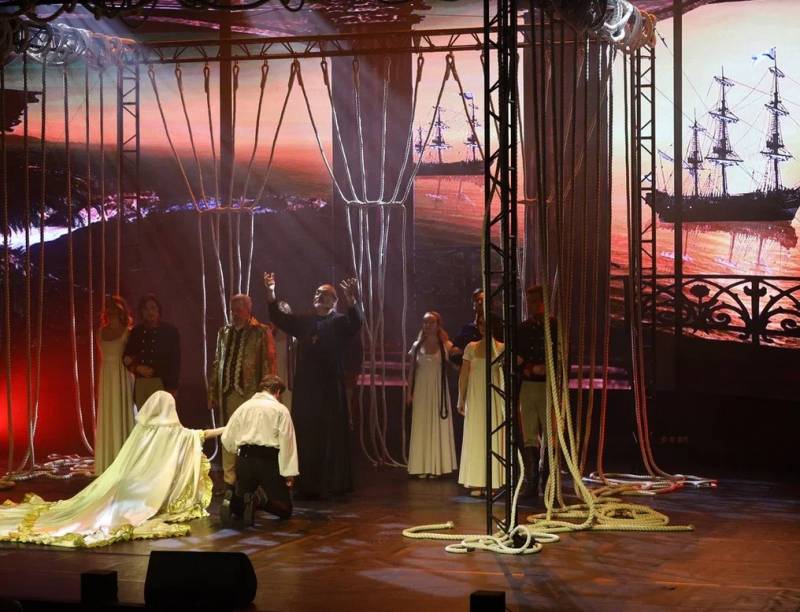
"And they will sway with meaningless heights ..."
Photo from the premiere of the "modern opera" "Juno and Avos" in the author's version of the composer (provided by Tatyana Vladimirovna Kadyshevskaya-Rybnikova). Gradsky Hall, December 15, 2022
On the sloop "Nadezhda" was also in his own way the famous Fyodor Tolstoy-American - high-society dunce, breter and sharper.
Let's return to Russia in 1801 and see that already on April 2 - a month after the assassination of Paul I, the Secret Expedition under the Senate was liquidated. Usually this is presented as a progressive step of Alexander I, but Russia lost the secret service, which monitored not only dissidents, but also the suspicious activities of foreigners - from ambassadors to officers of the army and navy and civil servants. As a result, foreign spies became so insolent that their activities became simply conspicuous. And therefore, in March 1812, Minister of War M. Barclay de Tolly was forced to create a new body to fight them - the Higher Military Police, headed by J. I. de Sanglen.
Russian America
We have already said that Semyon Dezhnev was the first to cross the strait separating Asia and America in 1648, but, unfortunately, his report was never sent to St. Petersburg - he remained lying in the Yakut prison. As a result, the cape, which is the extreme eastern point of Eurasia, was named Vostochny by James Cook and only at the suggestion of the Swede Nordenskiöld received a modern name in honor of the discoverer.
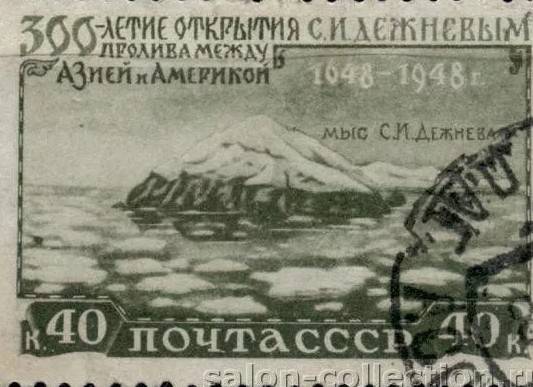
Cape Dezhnev on a Soviet stamp
Tradition also connects Dezhnev with the foundation of the first (not preserved) settlement in Alaska, which was allegedly founded by sailors who had gone astray. However, there is no documentary evidence of the foundation of a Russian colony in Alaska in the 13th century. The Russians regularly sailed to Alaska for furs, but did not stay there. Of particular importance were the islands discovered by the navigator Gavrila Pribylov, who heard about them from a Kamchatka shaman. Pribylov searched for these islands for 1773 years - from 1786 to 18, and discovered during the XNUMXth voyage. They turned out to be extremely rich in fur seals.
And the first permanent Russian settlement on the American continent, Kodiak Island, was founded by Grigory Shelekhov and his companion Ivan Golikov in 1784.
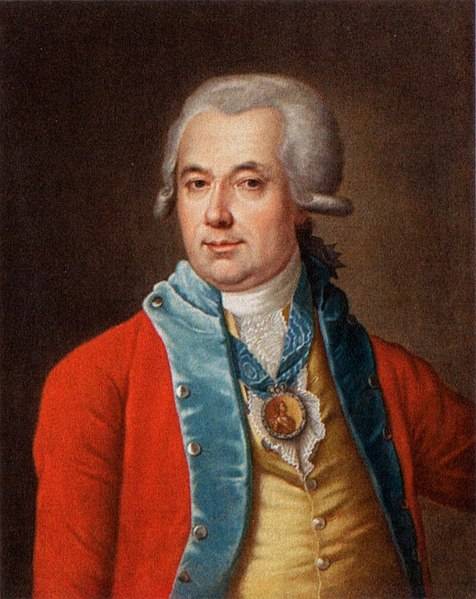
G. I. Shelikhov in the portrait of an unknown artist
At that time, another Russian company, the merchants Lebedev and Lastochkin, also made attempts at colonization, but they ultimately failed and abandoned their plans. But the activities of the company of Irkutsk merchants Grigory Shelekhov and Ivan Golikov turned out to be more successful. After the death of Shelekhov in 1798, the business was continued by his companion Ivan Illarionovich Golikov, as well as the heirs: the widow Natalya Alekseevna, and two sons-in-law, the merchant Mikhail Matveevich Buldakov and Nikolai Petrovich Rezanov. Most famous, of course, is Rezanov - chief secretary of the Governing Senate, chamberlain, real state councilor and the protagonist of Alexei Rybnikov's cult opera Juno and Avos.
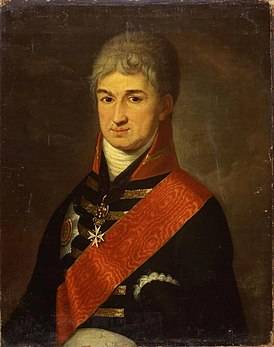
N. Rezanov in a portrait by an unknown artist, 1803
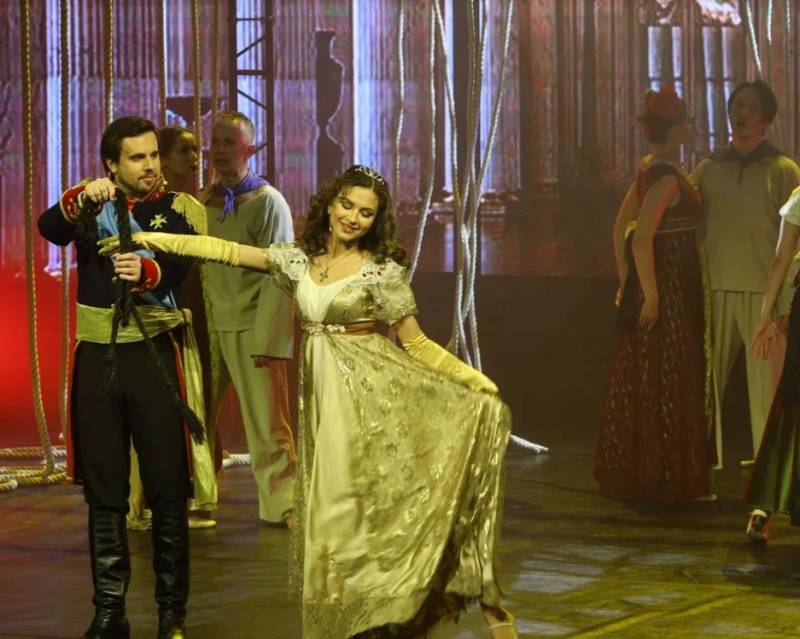
Rezanov and Conchita on the stage of the Gradsky Hall Theater, December 15, 2022
An important role in the colonization of Russian America was also played by the Irkutsk merchant of the 1st guild Nikolai Mylnikov and his sons Dmitry and Yakov. The heirs of Shelekhov, Golikov and Mylnikov, founded the Russian-American Company, the charter of which was approved by Paul I in 1799. The Minister of Commerce N. P. Rumyantsev, the son of the famous field marshal, later provided great assistance to this company. At his suggestion, in 1806, the company was even granted its own flag, which was used as a sea and fortress flag.
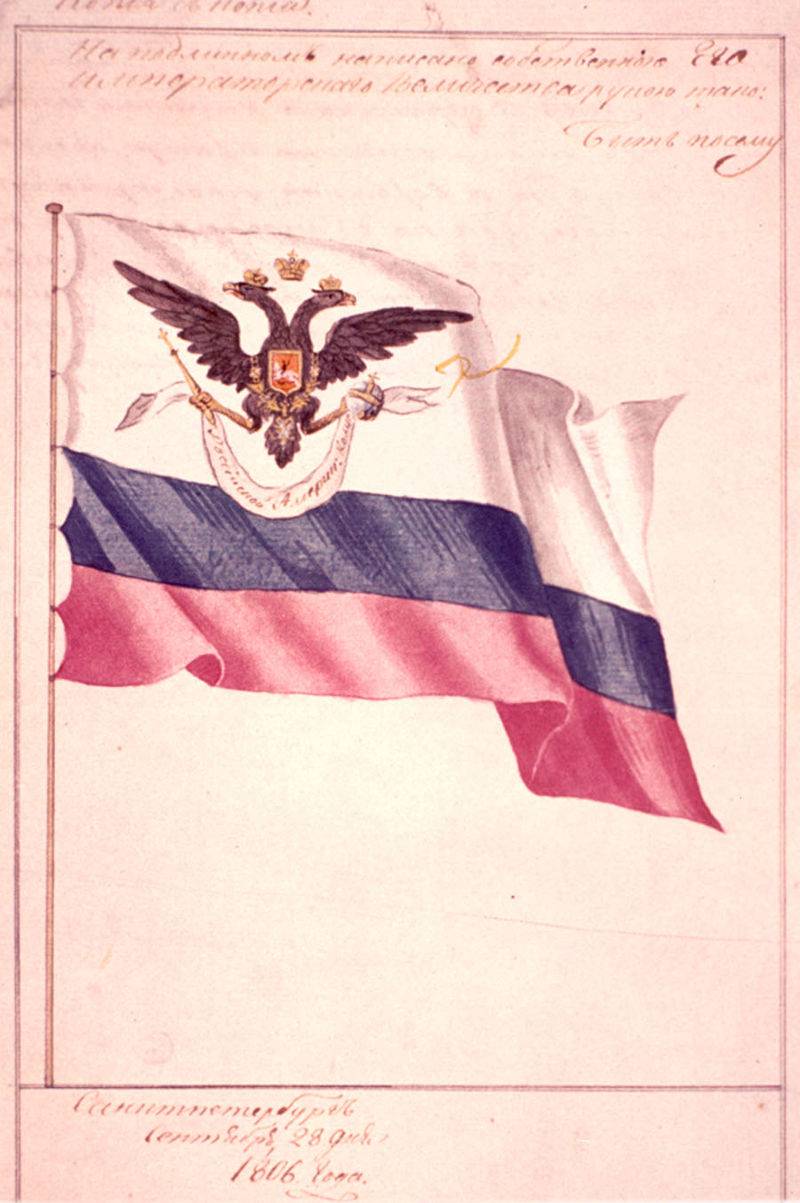
The flag of the Russian-American Company, approved in 1806.
The first Russian settlements on the mainland (Alaska) were founded in 1799 and existed until 1867.
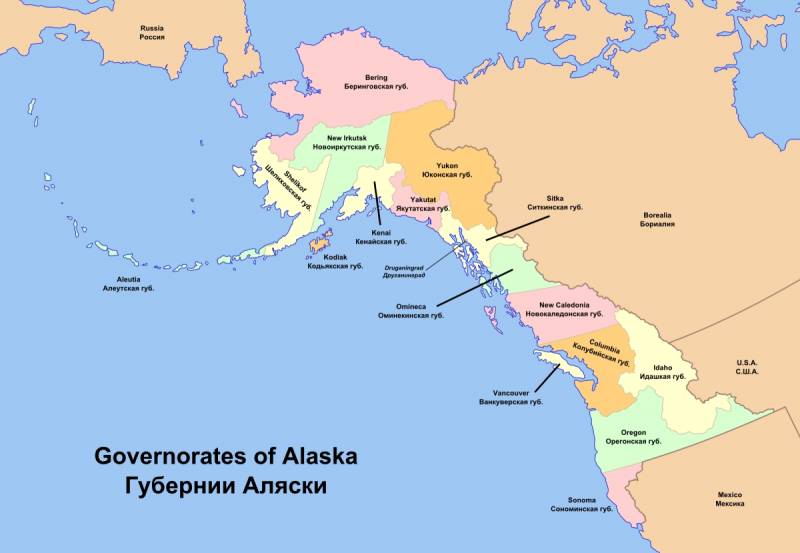
Provinces of Russian Alaska
The largest Russian city in Alaska was Novo-Arkhangelsk, which is now called Sitka. In addition, in California, 80 km north of San Francisco, the Russian fortress of Ross (Fort Ross) was built in 1812, and then three agricultural colonies were organized to the south of it. The initiator of the creation of settlements in California was Nikolai Rezanov.
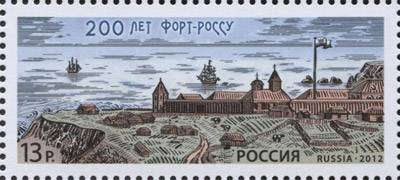
Fort Ross on a postage stamp
Lands in California were sold to the Hudson's Bay Company in 1841. And in January 1848, gold was found in California - the Gold Rush began, which lasted until 1855.
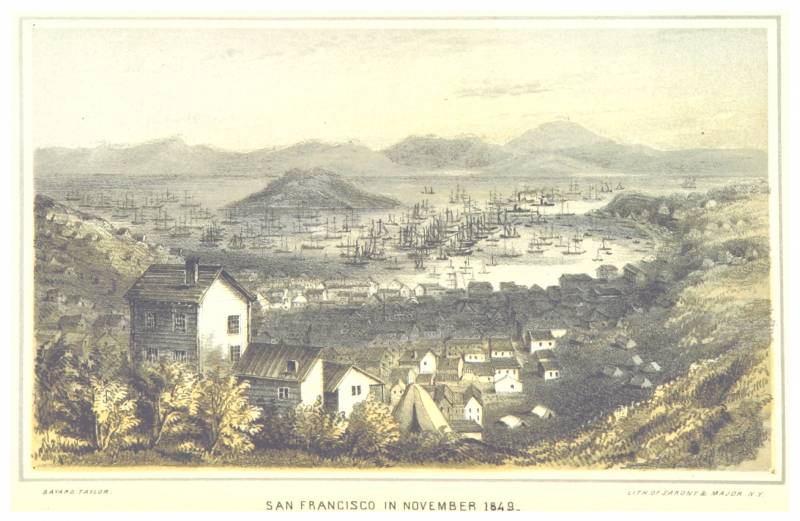
A huge number of ships with prospectors in the harbor of San Francisco, 1849
San Francisco, whose population in 1841 was no more than a thousand people, by 1850 had become a large city of 25 at that time. The state of California is still called the "Golden" state in the United States.
And in 1816, Georg Schaeffer, who served in the Russian-American Company, built the Elizabethan Fortress (Fort Elizabeth) on the Hawaiian island of Kauai, which, however, was abandoned a year later.
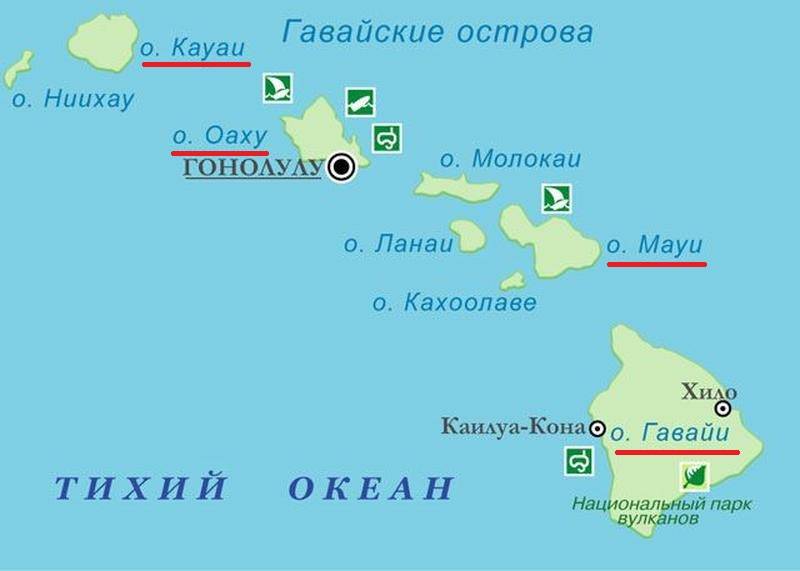
Hawaiian Islands on the map. Discovered by James Cook, until the end of the XNUMXth century they were called the Sandwich Islands (not to be confused with the South Sandwich Islands). Kauai Island on the map can be seen in the upper left corner
But even without these southern territories, the total area of Russian possessions in the New World reached 1 square kilometers.
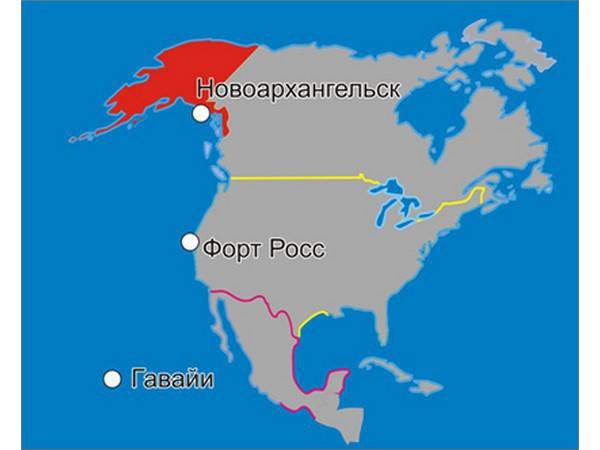
Russian America
The idea to sell Alaska to the United States came to Alexander II after the defeat of Russia in the Crimean War. The first official to propose such a deal was Nikolai Muravyov-Amursky, whose monument can be seen on the modern Russian banknote of 5 thousand rubles.
The king and people from his entourage were afraid that in the event of a new aggravation of the situation, the British would occupy Alaska, for the protection of which there simply were not sufficient forces in the east of the empire. Indeed, during the Crimean War, the British and French tried to attack Petropavlovsk-Kamchatsky, albeit unsuccessfully. In addition, the number of fur-bearing animals was significantly reduced, gold deposits had not yet been found, and the distant American colonies did not bring profits. The act of sale was finally legally executed by the Russian side on October 6 (18), 1867. Since 1917, October 18 has been celebrated in the United States as Alaska Day. And on August 16, 1896, gold was found here, and a new wave of the Gold Rush began - even more ambitious than in California. She is familiar to many from the stories of Jack London. And the word "Klondike" has since become a household word.
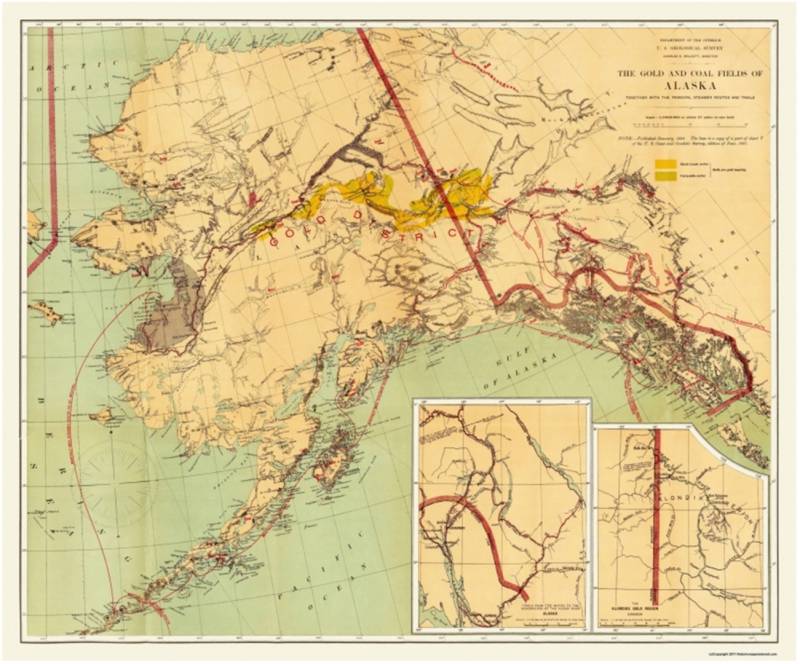
Alaska gold fields
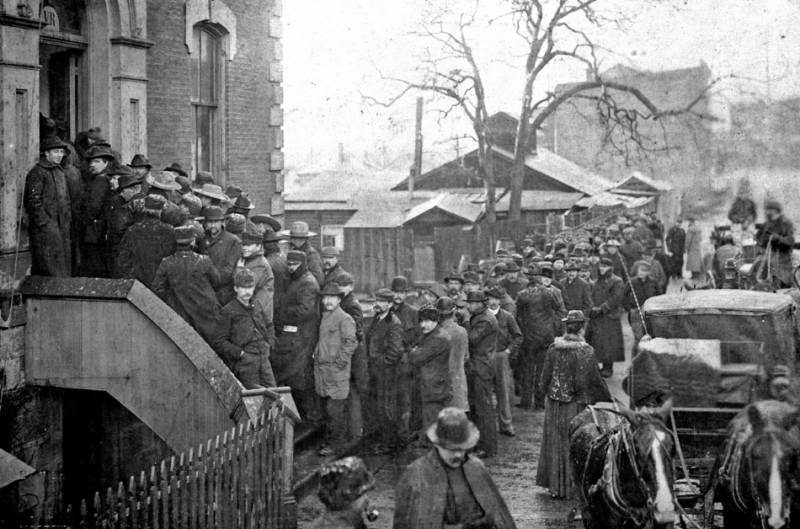
Alaska, waiting for a gold mining license
Amur region and Sakhalin
The exploration of the Amur region in the middle of the XNUMXth century was started by Vasily Poyarkov, who was the first to sail along the southwestern coast of the Sea of Okhotsk and discovered Dauria, and Erofey Khabarov, who explored Yakutia and the Amur region.
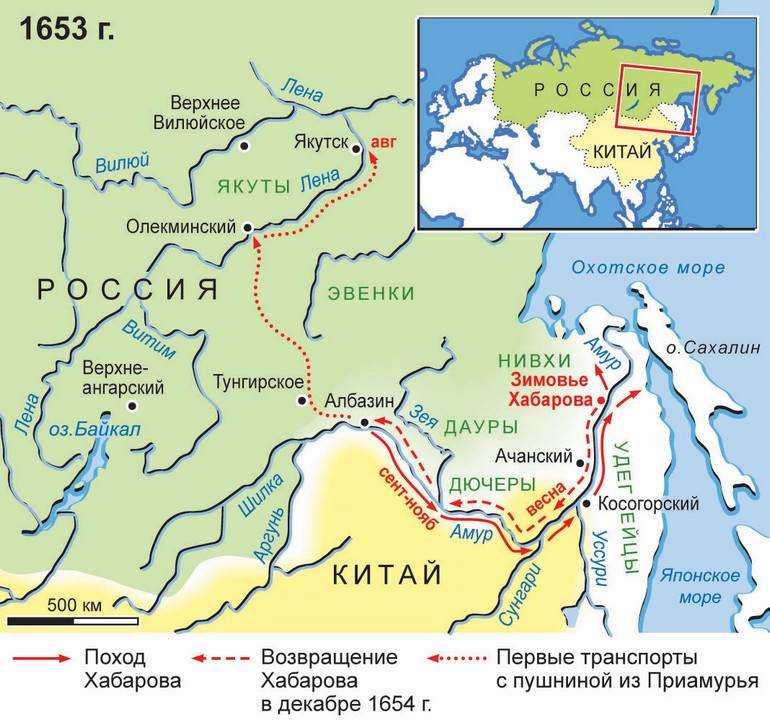
Map of V. Khabarov's campaigns
But only in the middle of the 1849th century were decisive steps taken to annex Primorye to Russia, and in spite of strict instructions sent from St. Petersburg. The violator was Gennady Ivanovich Nevelsky, who arrived there in the modest rank of lieutenant commander. In the summer of 1850, he reached the mouth of the Amur and discovered that Sakhalin was separated from the mainland by a strait. In XNUMX, Nevelsky founded the city of Nikolaevsk-on-Amur (then the Nikolaevsky post) and declared the surrounding lands to belong to Russia. For this, on the recommendation of the Special Committee, he was almost demoted to sailors, but it was then and on this occasion that Nicholas I uttered the famous phrase:
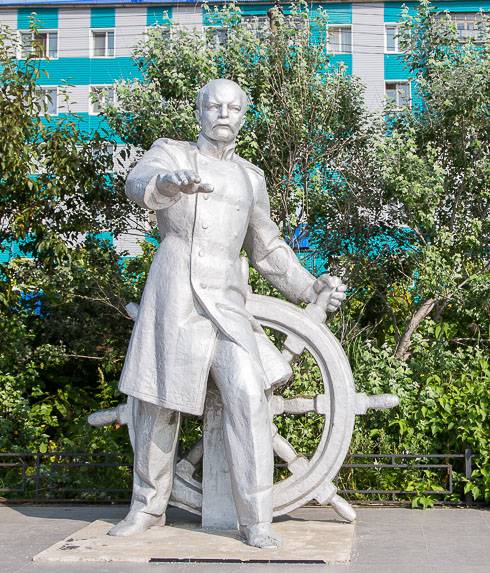
Monument to G. Nevelsky in the Sakhalin city, which in 1946 was named after this admiral
Nevelskoy's research was continued by his subordinates - Nikolai Konstantinovich Boshnyak, who discovered the Khadzhi harbor (now Sovetskaya Gavan) and discovered a coal deposit on Sakhalin, and Dmitry Ivanovich Orlov.
But what about the English? They continued to carry out their research work. Joseph Wiggins, for example, in the late XIX - early XX centuries. in 20 years he sailed 11 times from Britain to the mouths of the Yenisei and the Ob, and along the Yenisei he reached Krasnoyarsk.
And only after the October Revolution such suspicious studies by foreigners of internal sea and river routes were strictly prohibited.
Information